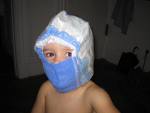 There have been numerous outbreaks involving the parasite cryptosporidium linked to swimming pools across the U.S. this year.
There have been numerous outbreaks involving the parasite cryptosporidium linked to swimming pools across the U.S. this year.
Yesterday, Rich Lakin of the Utah Department of Health said that 70 cases have been reported this year in Utah, Salt Lake and Davis Counties, up from the annual average of 40. As well, 3 confirmed cases in Mason City, Iowa led to the closure of two pools.
Larkin was cited as saying the parasite enters pool water through diaper-wearing children, swimmers who do not wash their hands after going to the bathroom and swimmers who do not shower before swimming in public pools. The parasite survives in the water and splashes of water are then ingested by the victims. People who become sick with the parasite remain contagious as long as two weeks after their symptoms disappear, so they need to stay out of public pools even after they feel better.
ABC4 in Utah reported that a quick observation of the Seven Canyons Fountain; a popular water play area for children in Salt Lake City’s Liberty Park revealed a number of children playing in the water while wearing nothing but diapers. Their parents sat next to signs warning pool users not to allow children in diapers into the water. It is this kind of behavior that invites the spread of Cryptosporidium.
Lakin was further quoted as saying, "People need to step up and realize if they do have watery diarrhea they need to stay out of the pools and not spread this any further. Again, it is chlorine resistant and it’s a very difficult disease to kill."
.jpg) Local health departments in Utah report that more than 150 cases of cryptosporidium have been, um, reported.
Local health departments in Utah report that more than 150 cases of cryptosporidium have been, um, reported.
 There have been numerous outbreaks involving the parasite cryptosporidium linked to swimming pools across the U.S. this year.
There have been numerous outbreaks involving the parasite cryptosporidium linked to swimming pools across the U.S. this year.